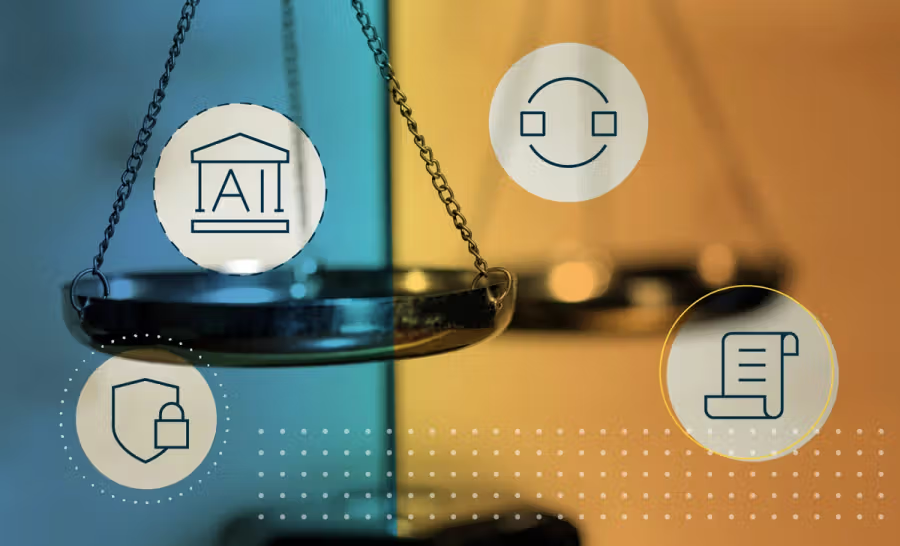AI model governance: What it is and why it’s important

In November 2022, generative AI exploded into public awareness, surging in popularity with the introduction of ChatGPT.
While the hype has settled down, AI — specifically, generative AI — continues to be a primary focus of organizations who want to leverage this game-changing technology for a wide range of capabilities. The collective impact of generative AI on global productivity could be as high as $4.4T annually, according to McKinsey Digital (1). And more than 50% of CIOs expect AI use to be widespread or critical in their organization by 2025.
If you strive to be data-driven and are leveraging AI technologies to gain a competitive edge, increase efficiency, and drive innovation, then you need to recognize, in addition to its potentially remarkable benefits, generative AI also presents significant risks.
Bias. Regulatory compliance. Privacy. These risks can have significant legal and reputational consequences.
That’s why AI governance is crucial in mitigating risks and ensuring your AI initiatives are transparent, ethical and trustworthy.
At Collibra, we define AI governance as the application of rules, processes and responsibilities to drive maximum value from your automated data products by ensuring applicable, streamlined and ethical AI practices that mitigate risk and protect privacy.
Why is AI governance so important?
Data governance has always been an integral part of data management, ensuring data is managed, protected and utilized responsibly. Historically, data governance catered to conventional databases and structured data systems.
When we talk about AI governance, we refer to a comprehensive AI governance framework designed to oversee and guide AI’s development and application. Think of it as the master plan or the roadmap for building and deploying successful AI products. This framework does more than just set rules; it provides a clear, repeatable process, ensuring AI programs are sustainable and reliable over the long haul.
By adhering to an AI governance framework, businesses can anticipate challenges, implement best practices, and maintain ethical standards, all of which are vital in today’s data-driven landscape.
AI models and governance
An AI model is, at its core, a mathematical construct. It takes data, processes it, and produces outputs, which could be predictions, decisions or insights. But how do we ensure that these models are making the right predictions? How do we ensure they aren’t biased or opaque?
That’s where AI governance steps in. It’s the system of checks and balances for AI models, ensuring they are transparent in their operations, accurate in their predictions and fair in their outcomes.
However, even though every CEO wants generative AI applications, creating them can be time-consuming and costly.
What are the challenges of AI governance?
Implementing effective AI governance involves significant challenges, especially as AI systems become more complex and are adopted across more industries. Organizations must monitor model performance to support business production while addressing concerns about ethics, AI compliance and privacy risks to support business integrity.
Without a clear framework, AI governance and compliance initiatives don't appropriately protect a business from legal or reputational challenges.
Some key challenges of AI governance include:
- Lack of transparency: Many times, end-users have little input into how decisions within a complex AI system are made, which can create accountability and transparency issues
- Bias and fairness: Unintended biases in training data can lead to problematic outcomes when AI systems, such as large language models are used
- Data quality or sourcing: Incomplete and poorly documented data can make it difficult to trace inputs and organizations that can't demonstrate data lineage may struggle with audit and compliance requirements
- Model drift: Over time, AI model performance can degrade as data changes and organizations must continuously invest in monitoring and training. Performance tracking requires continual monitoring and assessment of the accuracy and effectiveness of AI models
- Cross-functional accountability: Strong AI governance requires collaboration across IT, legal, data science and other teams. It also usually requires the intelligent use of AI governance software and other tools
- AI model complexity: AI models are complex and require a cross-functional team for development and deployment that includes expertise in various areas such as data science, software engineering and compliance
- Security and compliance: Ensuring the security and compliance of AI models is a critical challenge
- Few standardized practices: Standardized practices are lacking and this creates further difficulties in implementing AI model governance
How is AI regulated by the federal government?
As with any fast-moving technology, AI has surged forward while regulators lag. As of 2025, the federal government mostly regulates AI through existing laws and agencies. For example, deceptive and unfair AI practices related to marketing or finance might be managed by the Federal Trade Commission.
At the same time, presidential executive orders and guidance from numerous federal agencies have begun to address ethics and other challenges in AI. Businesses should expect additional regulations in the coming years and be ready to pivot accordingly with AI governance and compliance.
The essential components of AI model governance
Despite these challenges, nearly 8 out of 10 CIOs said scaling AI and ML use cases to create business value is their top priority over the next 3 years (2).
If you want to establish effective AI model governance, you’ll need your organization to utilize several essential components:
Clarify ownership and accountability
Organizations should clearly define ownership and accountability of AI model development and deployment. It is essential to establish clear roles and responsibilities, making sure that the team tasked with developing and deploying AI models has the necessary data and tools and follows best practices.
Establish cross-functional teams
Creating cross-functional teams that include individuals with expertise in various areas is critical in ensuring that AI models are accurate, ethical and compliant. Collaborating with different departments, such as legal, compliance, and security, ensures that AI models align with an organization’s objectives and comply with regulations.
Implement data tracking and issue resolution
Data tracking allows organizations to catch any issues during the development process, monitor performance, and make informed changes when necessary post-deployment. Real-time monitoring of data tracking can help identify and resolve development issues, such as bias or non-compliance, more efficiently.
Make informed AI model governance choices
To make informed choices about AI governance solutions, organizations must consider various factors such as model explainability, ethical considerations, and compliance with regulations such as GDPR and CCPA. Tools such as AI governance frameworks that incorporate these considerations help organizations make informed choices.
Define internal governance standards
Defining regulations such as ethical considerations, data privacy rules, and legal compliance is critical in promoting transparency and accountability in AI models and ensuring they align with organizational objectives. Organizations must define regulations for both the development stage compliance, as well as post-deployment monitoring.
Create comprehensive model documentation
Creating comprehensive documentation for AI models ensures transparency and accountability. The documentation should outline each AI model’s objectives, processes, and limitations and explain the data used to develop the model. Documentation should also include information about monitoring and performance tracking metrics.
To illustrate the importance of these essential components in AI model governance, consider this hypothetical example: an AI algorithm used in a health system. The algorithm aims to detect early signs of cancer based on patient symptoms. In this scenario, the processes involved in developing and deploying the AI model would require a cross-functional team that includes expertise in both data science and the medical field. Clear definitions of roles and responsibilities and regulations that promote data privacy and ethical considerations are also critical components in this scenario.
Collibra and AI model governance
In any context — from governing nations to playgrounds — governance ensures order, safety and productivity. It provides structure and direction. In today’s AI-powered landscape, effective governance is vital. The stakes are high and the complexities can be overwhelming. It’s why AI model governance is essential in navigating the challenges and potential pitfalls of this rapidly evolving technology.
Still feeling overwhelmed? We can help.
We developed an easy-to-implement guide to assist in the creation of successful AI products.
Discover our AI Governance Framework to learn more about how Collibra can help your organization.
___
Related articles

AIMay 21, 2024
Collibra wins prestigious 2024 Communicator Award for AI Governance campaign

AIJuly 15, 2024
How to observe data quality for better, more reliable AI

AINovember 13, 2023
AI ethics and governance: responsibly managing innovation

AI GovernanceFebruary 28, 2025
AI agents: Build or buy, governance remains critical
Keep up with the latest from Collibra
I would like to get updates about the latest Collibra content, events and more.
Thanks for signing up
You'll begin receiving educational materials and invitations to network with our community soon.
